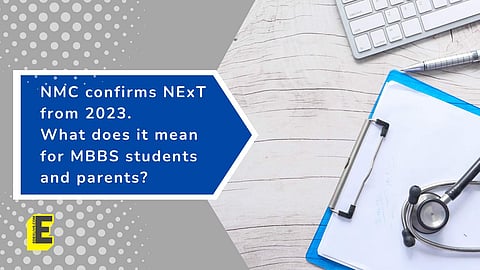

The uncertainty around the National Exit Test (NExT) might have been laid to rest with the reply to an RTI application by the National Medical Council (NMC), but with the details yet to be hashed out, parents and students are not quite out of the woods yet.
The NMC in 2019 had proposed the NExT exam as a replacement for the National Eligibility-cum-Entrance Test Postgraduate (NEET PG) and the Foreign Medical Graduates Exam (FMGE). Essentially, it is a licentiate exam for all medical graduates, both from foreign universities and those who completed their medical education in India. It also doubles up as an entrance test for admission into PG Medical courses in India. The NExT exam is to be conducted in two stages. Once students qualify Paper I of the exam, they will be required to do a compulsory one-year internship, after which, they will be eligible for Paper II of the test. Students who complete their MBBS degrees will have to clear this exam in order to register for medical practice in India. Only those students who have passed their MBBS degree with 50% marks will be eligible for NExT.
Going back to the RTI application...
In its reply to the RTI application by Dr Raj Shekhar Yadav, the NMC said that the exam will be implemented from 2023, and the modalities will be worked out once the NExT regulations are passed. Sources have told EdexLive that the exam will be applicable to students who began their undergraduate medical education in 2019. "I think that case would be ideal, because the NExT exam will be based on the CBME (Competency Based Undergraduate Curriculum) of the NMC, which was applicable from the batch starting August 2019. For any batches before 2019 to attempt NExT will be difficult because of the change in exam pattern and curriculum," reflects Aman Sharma, a third-year MBBS student based out of Rajasthan.
One of the aims of NExT was to make the final qualifying exam for MBBS graduates common thus, removing disparities between the quality of medical education across the country and filtering out so-called "unqualified" candidates. However, there is a certain downside to this move, believes Dr Yadav, who filed the RTI application. "Students who score lower marks in NEET UG (about 20%) are still being given seats in private and government colleges on the condition that they will score 50% in all subsequent exams during MBBS and MD. These students are simply being used by the government to occupy seats in medical colleges in the country, even as fee skyrockets. Now, they will struggle to clear the NExT exam and if they fail, that will mean that their five-year Medical UG degree has gone to waste, and so has all the money they have invested in that education. It is unfair to them," Dr Yadav says.
Preparation commences
Even as the regulations for NExT are awaited, students have forged ahead with their preparation for the all-important exam. "My daughter, who is in her third year of MBBS has already signed up for NExT coaching, which is costing us an additional Rs 30,000 per year. About 90% of UG Medical students I know have also signed up for the exam," Manoj Jain, the father of a UG Medical student in Rajasthan tells EdexLive. He also shares that the exam has added to the stress of the parents. "The government takes these decisions, but the burden falls entirely on the parents and the students. In the time that comes, students will feel like the medical stream was a mistake and a burden. Students will have to study round-the-clock and parents will feel the financial stress of it as well," Jain explains. One way to ease the burden on the parents for these exams is to offer interest-free loans to parents so they can afford medical education and coaching, he suggests.
Issue of coaching culture
However, coaching is an integral part of Medical education already, points out Sharma. "As a student, I would have taken coaching for NEET PG anyway. So I don't understand how studying for another test in place of NEET PG makes a difference," he says. NEET PG is the entrance test for postgraduate Medical education in India, applicable to those opting to join PG courses. On the other hand, with NExT being a licentiate test, it applies to all students looking to practice medicine in India.
Coaching is a by-product of any uniformed entrance test, says Manickavel Arumugam, a medical admissions counsellor. He, however, points out that the need for coaching only arises because colleges fail to teach the subjects properly. "NExT is only going to test what the students have been taught during four years of MBBS. And if they still require coaching, then that means the college has failed. We don't focus on the quality of education in these colleges when we talk about coaching. The fear of parents and students is how these coaching institutes make money," he explains.
With NExT being the common final exam for all MBBS graduates to practice medicine in India, the authority of medical colleges to hand out medical licences is being withdrawn. Arumugam remarks that the filtering or passing criteria of the NExT exam is still to be worked out. And without that information, it is difficult to ascertain whether the exam will be disadvantageous to those who scored lower marks in NEET UG or in their MBBS. "NExT will create a level playing field. It will give students better visibility of the quality of colleges, depending on how many of their students are able to clear the common final licentiate exam. Colleges then will also work towards providing better quality education," he predicts.
